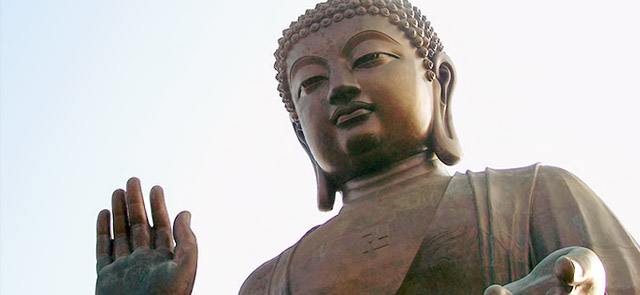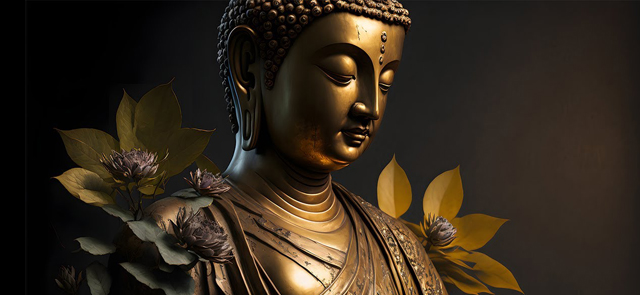It is very important to be clear about what we mean by the word emotion. An emotion is the meaning we give to our felt states of arousal and generally occurs when an object is considered as something attractive or repulsive. In Buddhism however, emotion is much more than that. It is a mental state that starts the instant the mind functions in a dualistic mode, long before the normal person is conscious of it.
We can also say that Emotion is the habitual clinging that makes us automatically categorize our experiences according to whether our ego finds them desireable , unattractive , or neutral. The more clinging there is, the stronger our reactions will be, until we reach a point where they finally break into our conscious mind and manifest as the obvious feelings we usually call emotions.
To most people Buddhism is a religion. It has no god, it has no central creed or dogma and its primary goal is the expansion of consciousness, or awareness. Buddhism is a system of inquiry into the nature of what is.
The mind is the root of all our experience, both of ourselves and of others.The Buddhist view of how the mind and emotions works is somewhat different from the traditional Western view. Buddhism uses intelligence to control the emotions. Through meditative practices, awareness can be trained and focused on the contents of the mind to observe ongoing experience. Techniques of awareness permit the cultivation of self-control. They allow people to break the negative emotional chain reaction and head off the hopelessness and despair it leads to. By focusing attention, it is possible to monitor your environment, recognize a negative stimulus and act on it the instant it registers on awareness.
Master Shi Yong Po [Chin.: shìy?ngp? ??? | 1926 - ]
We can use intelligence to control our emotions. Through meditation, awareness can be trained and focused on the contents of the mind to observe the ongoing experience. Such techniques are of growing interest to Western psychologists, who increasingly see depression as a disorder of emotional mismanagement. In this view, attention is preoccupied by negative events and then sets off a kind of chain reaction of negative feeling, thinking and behavior that has its own rapidity and inevitability.
Techniques of awareness permit the cultivation of self-control. They allow us to break the negative emotional chain reaction and head off the hopelessness and despair it leads us to. By focusing attention, it is possible to monitor our environment, recognize a negative stimulus and act on it the instant it registers on awareness. While attention as traditional psychologists know it can be an exhausting mental activity, as a practice it actually becomes a relaxing and effortless activity.
Buddhism does not ignore human emotions.
«Our feelings are our most genuine paths to knowledge. Knowledge of our inner, true self.Emotions are energy in motion. They bring us information if we are willing to experience them. Unfortunately, many of us are afraid of the energy of emotions and so we automatically resist them. And when we refuse to experience our emotions, we block them up. They become trapped and that entrapment drains our energy and brings continuing discomfort.
No Mind; Just Heart.»
Master Shi Yan Zhuo [Chin.: shìyánzhuó dàsh? ????? | 1965 - ?]
We don’t have to let emotions push us into action or reaction. We ought to “stop” and “pay attention”. Allow “these” emotions to be and to speak to us. Once they are acknowledged, their energy is released.
We usually resist or rebel against emotions or to try to get around them by devising all sorts of tricks; instead accepting them directly, as they are.
We have to become more conscious of our emotions. By learning to identify emotions and managing our reactions, we can view life based on current information instead of being held captive by our past.
Psychology holds to the belief that things like attention and emotion are fixed and immutable. On the other hand, the mind can be trained. This view has increasing support from modern neuroscience, which is almost daily providing new evidence of the brain’s capacity for change and growth.
We don't have to change everything about who we are and what we do. We can return to a state of simplicity and relaxation through the practice of mindfulness.Basic Meditation Exercise
Master Shi Yong Po [Chin.: shìy?ngp? ??? | 1926 - ]
1. Sit with an alert and relaxed body posture so that you feel relatively comfortable without moving. (You can sit either in a straight-back chair with your feet flat on the floor or on a thick, firm cushion.)
2.Keep your back, neck and head vertically aligned, relax your shoulders and find a comfortable place for your hands (usually on your knees).
3. Bring your attention to your breathing. Observe the breath as it flows in and out. Give full attention to the feeling of the breath as it comes in and goes out. Whenever you find that your attention has moved elsewhere, just note it and let go and gently escort your attention back to the breath, back to the rising and falling of your own belly.
4. When you can maintain some continuity of attention on the breath, try expanding the field of your awareness “around” your belly to include a sense of your body as a whole.
5. Maintain this awareness of the body sitting and breathing, and, when the mind wanders, bring it back to sitting and breathing.






